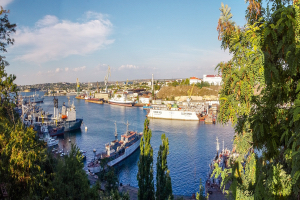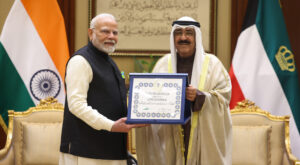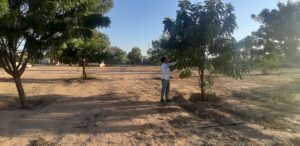
File photo of Sevastopol in Crimea
 By Deepak Parvatiyar
By Deepak Parvatiyar
Russia today resumed its participation in the Black Sea Grain Initiative to facilitate the safe navigation for exports of grain, foodstuffs and fertilizer from Ukraine. Announcing Russia’s decision, the United Nations Secretary-General António Guterres said in New York that he was grateful for the diplomatic efforts of Turkey, and he also thanked the United Nations Coordinator, Amir Abdulla, and his team for their work to keep “this vital food supply line open”.
“The Secretary-General continues his engagement with all actors towards the renewal and full implementation of the Initiative, and he also remains committed to removing the remaining obstacles to the exports of Russian food and fertilizer,” his office stated.
Following Russia’s decision, the United States Secretary of State Antony J. Blinken spoke today with Turkish Foreign Minister Mevlut Cavusoglu to thank him for his country’s efforts to secure a resumption of the Black Sea Grain Initiative by encouraging Russia’s return and “reminding Moscow of the importance of continued adherence to UN-brokered agreements and its commitments to support global food security”.
Moscow’s surprise decision came mere hours after Russia’s foreign ministry spokeswoman Maria Zakharova today said that “any further discussion on any matter related to this will only be possible if Ukraine provides clear guarantees that it will not use this humanitarian corridor and Ukrainian ports to engage in hostilities against Russia”. Soon thereafter, Russian President Vladimir Putin in a telephone conversation with the President of Indonesia Joko Widodo talked about Russia’s decision to resume the implementation of the grain initiative as he said Ukraine agreed to guarantee the non-use of the humanitarian route for military purposes. It was noted that Russia was ready to ship considerable amounts of grain to the poorest countries free of charge as humanitarian aid. Joko Widodo supported this approach.
Many charges were already traded before Russia took a U-turn to rejoin the Initiative it had suspended on October 29, 2022.
Putin had then justified the move by not just blaming Ukrainian “terrorist attacks” against the Russian Black Sea fleet – its warships and civilian vessels in Sevastopol, but also by claiming that the food grain was not reaching the poor nations and instead, was consumed by Europe and Turkey.
The Russian President said in a press conference on October 31, 2022, that although the entire process of exporting grain from the territory of Ukraine was organised under the pretext of securing the interests of the poorest countries, “I don’t remember the data of the latest hours or days, but the overall picture is as follows: about 34 per cent of the grain ends up in Turkey; a little more, or 35 per cent, in the EU [European Union] countries. And only 3–4 per cent, according to the Agriculture Ministry, sometimes a little more, up to 5 per cent (this figure changes depending on the volume of grain transported), so only 3–4 or sometimes 5 per cent goes to the poorest countries as the UN classifies them”.
But was Putin lying? The Americans believe so.
“That is just false…66 per cent or two-thirds is going to developing countries; 19 per cent of the overall grain is going to the world’s least developed countries. There is a ship that is loaded in a Ukrainian port right now, a ship that was paid for by the World Food Programme, destined, if it is permitted to leave by the Russians, for Ethiopia, a region that – a country in a region that desperately needs this,” the US State Department spokesperson Ned Price claimed in Washington.
He reaffirmed: “The Russians can distort the data in any way they wish, and I’m sure they will. When they point to some of this grain going to countries in Europe, some of this grain does go to Europe, where it is refined and then sent on to developing middle-income, lower-income countries as well. But the fact remains, the vast majority of this grain – 66 per cent – is going to developing countries; 19 per cent – nearly 20 per cent – is going to the world’s least developed countries, the countries that need this the most.”
Fearing that Putin’s move to suspend the Initiative would cause global famine, Washington asserted that there could be “no justification” for Russia to pull out of the Initiative. “Moscow doesn’t care, if the world goes hungry. Moscow doesn’t care, if people starve. Moscow doesn’t care, if the world’s food insecurity crisis is compounded,” Price stated.
Putin though stuck to his ground. He said Ukrainian drones and unmanned vessels partially entered the corridor used for exporting grain from Ukraine, thus creating a threat to Russian civilian ships securing the grain exports. “… these unmanned vessels are no joke. They are six metres long, I believe, and carry 500 tonnes of explosives. If it hits its target, there will no grain, no ship, nothing. And we will be to blame”.
So where does the buck stop?
While Putin urged the United Nations Secretary-General and UN staff to secure a guarantee from Ukraine that Russian civilian ships and support vessels will not be threatened, he also clarified that Russia never said it was withdrawing from the Initiative but had only suspended its participation. He asked the United Nations to deal with Ukraine and make sure Ukraine guarantees the security of the grain corridor.
However, the USA was not prepared to buy Putin’s arguments – “Whatever argument the Russians put forward doesn’t take into account that this would impede the ability of grain to reach countries around the world that are desperately in need of it. You can listen to Russian justifications for the actions they’ve taken throughout the course of this war. They in many cases have been entirely devoid of facts, increasingly detached from reality.”
The Americans claimed Russia itself had attacked Ukrainian ports – Odessa and the port of Pivdennyi – since the start of the Black Sea Grain Initiative. Price further claimed: “There are ships – suffice to say, there are ships in Black Sea ports that are loaded, that are ready to go. There is one chartered by the World Food Programme, loaded with 30,000 metric tons of wheat for the emergency response in the Horn of Africa. There are dozens of other ships that would be in a position to set sail in the coming days if only Russia would not stand in the way. So, this is an urgent challenge.”
Highlighting the vitality of the Initiative, Price pointed out that a vast majority of the nearly 10 million metric tons that as delivered under it went to the developing world, a large share of that – about a fifth of it – went to the world’s least developed countries. “The World Food Programme sources half of its wheat from Ukraine in a typical year, underscoring the importance of this initiative to providing for the world’s poor,” he said.
Martin Griffiths, Under-Secretary-General for Humanitarian Affairs and Emergency Relief Coordinator at the United Nations, earlier told the United Nations Security Council, that each fraction of a percentage of increase in the price of food pushes someone, somewhere around the world over the line into extreme poverty.
The UN Secretariat at the Joint Coordination Centre meanwhile reported that the Ukrainian, Turkish and United Nations delegations agreed not to plan any movement of vessels in the Black Sea Grain Initiative today, November 2, 2022. Yesterday the UN and Turkish inspectors concluded 36 inspections on board outbound vessels. The teams boarded another two ships, but the process was suspended due to issues related to fumigated cargo.
Farhan Haq, Deputy Spokesman for the Secretary-General said in New York on November 1 that all inspection reports after Russia suspended its participation were a temporary and extraordinary measure and will be shared with the Russian and Ukrainian delegations. On October 31, 2022, 46 inspections on board outbound vessels were completed by UN and Turkish inspectors. Also, a total of 14 vessels — 12 outbound and 2 inbound — including a vessel chartered by the World Food Programme (WFP), transited the corridor safely. The UN Secretariat further informed that the UN Coordinator for the Black Sea Grain Initiative, Amir Abdulla, in close cooperation and consultation with the Turkish delegation at the Centre, was exerting all efforts to resume full participation at the Centre.
As the UN and Turkey did say that they would continue releasing ships, Putin had stuck to his claim that “the United Nations is supposed to deal with Ukraine and make sure Ukraine guarantees the security of this corridor”.





